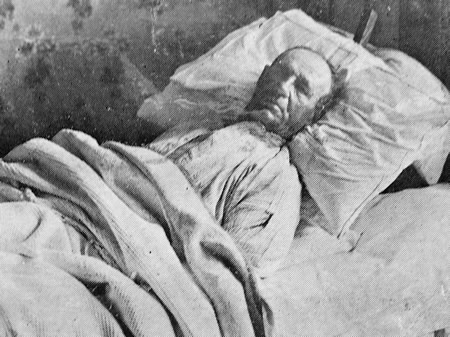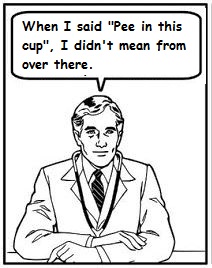Via Insty (thankee, Squire), I saw this:
Avoiding couches and chairs might be a good way of keeping your back pain from getting worse, new research suggests. Finnish researchers found that when people with back pain sat even a little less each day, their pain was less likely to progress over the next six months.
Well, yes, but it depends on your definition of “sitting”, and I’m not being Clintonian, here.
A couple of years before Connie discovered she had cancer, she had back problems — I mean serious back issues, along with crippling sciatica. Basically, she had three back operations (I forget which, L1S2 or vice-versa), had one of those electrical shock thingies implanted in her butt (electrodes linked to her spinal and sciatic nerves) and of course, serious pain medication.
How had this happened? Well, basically, as it was explained to us by her back doctor, Richard Guyer of the Texas Back Institute (the man who fixed Tiger Woods’s back), it was because her job was 95% sedentary. But first, a little history lesson.
According to Guyer, the worst invention ever created by Man was the upright chair. Basically, the human body was conditioned over millennia of development into two basic positions that could be held for hours on end: standing erect and lying prone. The first was for survival purposes (hunting, herding and farming) and rest (sleep).
What the chair did, over a relatively short period of time, was to force the body into a position it wasn’t designed for, which of course placed all sorts of strain onto it, and most especially into the back. While early chairs (mostly stools and benches) did not encourage lengthy periods of being seated (upright backs and hard seats), the addition of cushions and the creation of non-physically active tasks (e.g. clerical) had the effect of making upright seating a little more comfortable but no less damaging to the spine. In fact, the added length of time while seated speeded up the damage process.
This is why so many early clerical jobs took place in a standing position, by the way, hunched over tall lecterns instead of being seated at desks — it really helped, and many people in the modern era who have gone back to working in an upright position can testify to the improvement in their physical health thereby.
But what if you can’t stand up for long periods of time? An aside:
In my case, a youth spent playing competitive sport had messed my knees up — to the point that when I went to an osteopath several years ago, he looked at my X-rays and asked whether I was in the flooring business, because they only time he’d ever seen knees in this condition was from patients who installed carpets for a living. (I made a joke about it and said that I was on my third marriage, whereupon he laughed and said, “Oh well, that explains it.”) But my knees were and are no joke — it’s the reason I qualify for “cripple” license plates, by the way, because I can walk a little distance with no rest and without pain, but thereafter I have to start popping pain pills like M&Ms. My daily pain-free distance at the moment is about 100 yards, cumulatively — about the distance walking to and from the car across a large supermarket parking lot, and a long shopping trip in the supermarket itself. After that, my knees seize up and I reach for the Tylenol. But back to the main story…
Anyway, Dr. Guyer’s solution to both my and Connie’s problem was to eschew sitting upright altogether, or at least for any serious length of time. But for her job (training system design and tech writing) and my writing, that was not possible.
The solution? Anti-gravity or, as we used to call them, Laz-Y-Boy reclining chairs.
Connie’s back, as it turned out, was too far gone, although her recliner helped some. In my case, with only a “serious” (as opposed to her “critical”) back issue, the effect was close to miraculous: my decades-long back pain disappeared within a matter of days, and I could (and still can) remain seated all day without back pain. (I do have to get up throughout the day for coffee, meals and the related nature calls, relax, so I’m not going to die of deep vein thrombosis.)
So yeah; as the Finnish boffins claim, sitting down less will help alleviate back pain and -injury. But if you have to remain seated, do so in a reclining position. It really works.
Even if the lack of exercise causes you to get other problems, like a fat gut.

You all know how to fix that problem: eat less, eat better and exercise. Or pay through the nose for Ozempic, like I have.



